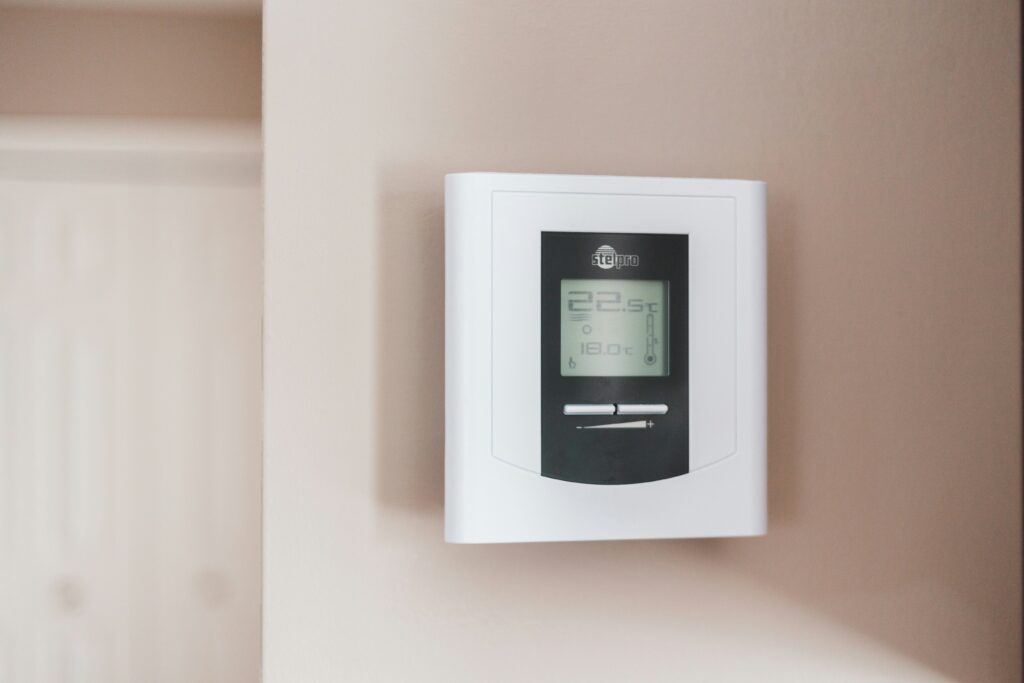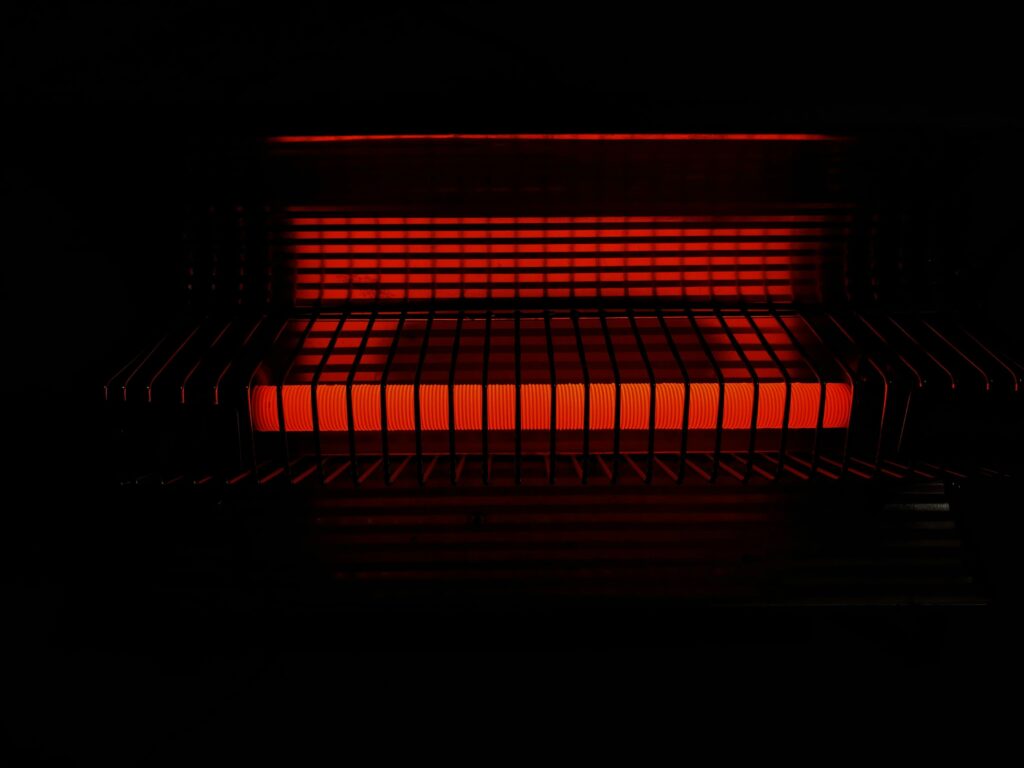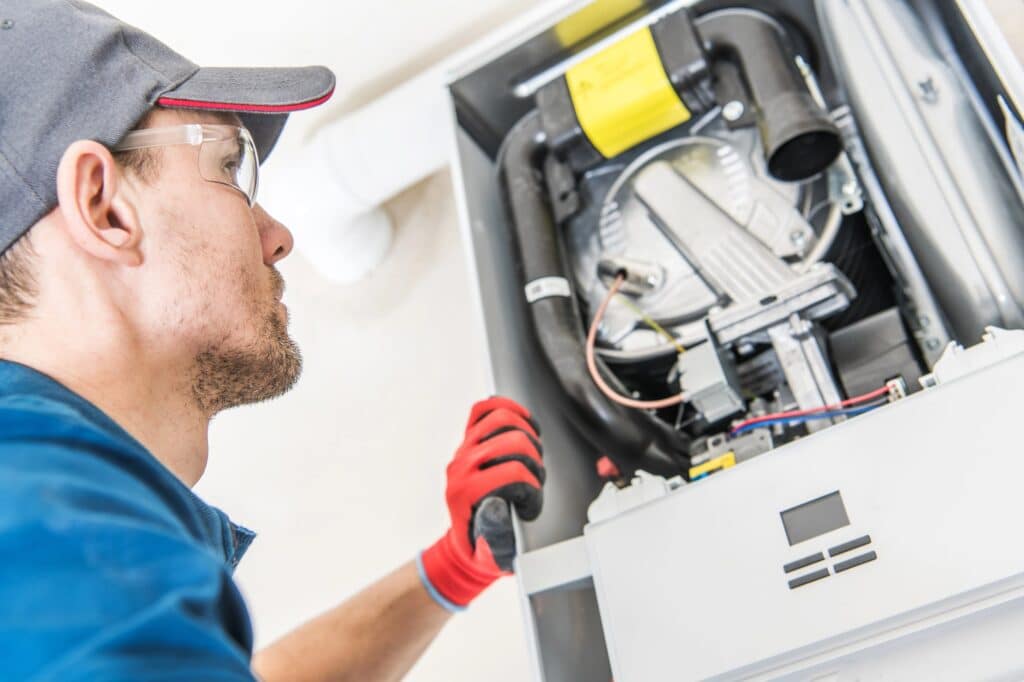Strange smells coming from your heater can be alarming. Whether it’s a faint burning scent or a musty odor, you’ll want to know what’s going on.
It’s important to take these smells seriously as they can signal problems, from minor dust issues to significant mechanical faults. Never ignore a smell that sticks around as it may suggest electrical issues or other dangers that need professional attention.
Understanding what each smell means helps you address the problem safely. You’ll learn how to handle these situations and when to call in the experts, ensuring your home’s comfort and safety. Take a deep breath and stay informed about your heater’s health.
What Causes A Burning Smell From Your Heater
When your heater emits a burning smell, it could be due to various common issues. Learning about these causes can help you identify and address the problem safely and efficiently.
Common Reasons For Heater Smells Like Burning
A burning smell from your heater might occur for several reasons. Dust accumulation is one of the most frequent causes, particularly when you first turn on the heater after months of inactivity. Dust collects on the heating elements and burns off when the heater is used again. Another possibility is a malfunctioning thermostat or obstructed air filter, which causes the heater to overheat and emit a burning odor.
Electrical issues, such as worn or damaged components, can also lead to a burning smell. Identifying these problems early can prevent potential safety hazards.
Burning Dust And Other Odors
When a heater has been unused for a long time, it may emit a burning dust smell. This happens when dust on the heating elements burns off as the heater warms up. Typically, this smell dissipates quickly and isn’t a cause for concern.
If the smell reminds you of burning plastic, it’s essential to investigate further. It may imply overheating components inside the heater, potentially caused by a faulty thermostat or blocked airflow. These issues demand prompt attention to prevent damage or fire risks.
When To Be Concerned About A Burning Smell
While some burning smells are typical, knowing when to worry is crucial. If the burning smell coming from your heater persists beyond the first few uses or resembles burning plastic, it’s time to investigate. Also, if you notice flickering lights or hear unusual noises, it’s wise to turn off the heater immediately and call a professional.
Musty smells may indicate mold or mildew in your ducts, requiring thorough cleaning. For persistent burning smells or recurring problems, always consult an expert to ensure your heater operates safely.
How To Diagnose The Source Of Heater Smell
Identifying and resolving strange odors from your heater can be crucial for safety and comfort. Recognizing different kinds of smells and knowing how to check your heating system can help you pinpoint potential issues and keep things running smoothly.
Identifying Specific Heater Odors
Different smells can signal various problems in your heating system. Knowing the difference can help you diagnose furnace odors effectively. Burning Dust is a common smell, noticeable when turning on your heater after a long period. It typically comes from dust settling on heating elements or vents. Another odor, burnt plastic, might mean some plastic parts are melting due to overheating.
The smell of rotten eggs indicates a gas leak, which is serious and requires immediate attention. Call a professional technician if you notice this odor. Meanwhile, a musty smell can point to mold growth, which can occur if moisture has accumulated inside your system. Understanding these odors helps in identifying the source of the smell.
Checking The Heating System For Issues
A careful inspection of your heating system can reveal underlying problems. Start by turning off the heater and letting it cool down. Check the air filters, which should be clean and free of dust. A clogged filter can lead to overheating and trap odors inside your home.
Examine the heating elements for wear or damage. If they appear burnt or damaged, they may cause a burning smell when operating. Look at the ventilation system for any obstructions that could cause inefficient operation or trap unpleasant smells.
Enlisting a professional can help diagnose more complex issues, such as faulty heaters or electrical problems. This ensures that any required repairs are completed safely.
Importance Of Regular Maintenance
Regular maintenance goes a long way in preventing heater smells. Schedule routine HVAC check-ups, especially before winter. This involves cleaning and checking the overall system for potential issues. Simple tasks, like replacing air filters every three months, can prevent dust and debris from accumulating.
Regularly inspect your heater for any signs of damage or unusual furnace odors. Address small issues promptly to avoid them escalating into costly repairs or safety hazards. Maintaining your heating system not only ensures a pleasant indoor environment but also extends the life of your equipment. Keep your home safe and comfortable by making regular checks part of your routine.
What Should You Do If Your Heater Smells Like Burning

A burning odor from your heater can be alarming. It’s important to address the issue immediately to ensure safety and maintain the efficiency of the equipment.
Immediate Steps To Take
If you notice a burning smell, turn off your heater right away. This will prevent any further issues. Check for obvious causes such as visible smoke or burning materials around the heater, and remove them if safe to do so. Make sure the space is well-ventilated by opening windows and doors to allow fresh air to circulate.
Next, take a look at the air filters. Dust buildup on filters is a common cause of odors in heaters. Cleaning or replacing these filters can often solve the problem. If the smell persists, it might be due to other issues like overheated components or faulty wiring, which may require more attention.
When To Call For Heater Repair
While some issues can be fixed quickly, others need professional help. If the burning smell doesn’t go away after cleaning or if you see sparks, it’s time to contact a heating technician. Ignoring potential electrical issues might lead to safety hazards, and expert inspection is crucial in such cases.
Also, if your heater frequently emits a burning smell despite cleaning, it could indicate a deeper problem that requires specialized knowledge. Certified professionals are trained to handle such complex problems and ensure your heater is safe and working properly.
Preventative Measures For Future Odors
Regular maintenance is key to preventing burning smells. Clean your heater and replace filters regularly to minimize dust accumulation. Schedule annual check-ups with a professional to catch any early signs of malfunction. These habits keep your heater working efficiently and can extend its lifespan.
Ensure the area around your heater is always clear of items that could cause burning. Avoid using extension cords, as these can overheat and contribute to smells. A clean and well-maintained heater not only reduces odors but also helps keep your home safe and warm.
Understanding Different Types Of Heater Odors
When your heater emits a strange smell, it can indicate a problem. Whether it’s a rotten egg smell, an electrical burning scent, or a musty odor, each can signal different issues. It’s important to recognize these smells and act appropriately.
What Does A Rotten Egg Smell Indicate?
A rotten egg smell may indicate a natural gas leak, which is dangerous. Natural gas itself is odorless, but companies add a sulfur-like smell to alert you if it’s leaking. If you detect this odor, it’s crucial to act quickly. Turn off your heater, leave your home, and contact the gas company immediately. Do not switch on electrical devices or ignite a flame, as gas is highly flammable. Regular inspections can help prevent leaks and ensure safety. This smell should never be ignored, as it can lead to severe health hazards.
Recognizing Electrical Burning Smells
An electrical burning smell could mean overheating in your heater’s wiring or components. This often smells like burning plastic or metal. If the smell comes from your furnace, it might indicate an issue with the motor or other electrical parts. Overloading circuits or worn-out components could be the cause. Turn off your heater if you notice this scent and call a professional to inspect. Operating a heater in this condition might lead to further damage or even a fire. Keep your heater maintained and regularly checked to reduce these risks.
Musty And Dusty Smells From Your Heater
Musty odors are often caused by dust accumulating on the heater elements or within the ductwork. This dust burns off when the heater runs after long periods of inactivity, creating a smell. If the scent persists, it might mean mold or mildew, especially if moisture is present in the system. Clean filters and ducts regularly to prevent musty smells. Using a dehumidifier can help reduce moisture levels. It’s important to address these odors, as they can affect your air quality and health. Regular cleaning and maintenance can ensure your heating system runs safely and efficiently.
Why Does My Heater Smell Like Burning When First Turned On

When you first turn on your heater after it’s been off for a while, you might notice a burning smell. This is a common concern for many people and can happen for a few reasons. Understanding these causes can help ensure that your heating system operates safely.
What Happens During The First Use?
When you first use your heater in the winter, it might emit a burning odor. This happens because dust settles on the heater’s components, like the heat exchanger or burners, during months of inactivity. When you start it up, the dust burns off, creating a noticeable smell. This is typically not a cause for alarm and usually goes away after a short time.
Your nose might detect this odor mostly during the first few uses. This is simply a normal reaction when dust is involved. Regular maintenance and proper cleaning can help minimize this scent and ensure your heater functions optimally.
Dust Accumulation And Its Effects
Dust collects on your heater when it’s not in use. This might lead to a burning scent when you first activate the system. When dust builds up, it can affect airflow, resulting in inefficient heating. It’s important to change air filters regularly to reduce this problem.
The burning smell when first turned on is often linked to this dust burning away. If the smell persists beyond the initial uses, check filters and vents. A professional inspection might be needed if the problem continues.
Is It Normal For New Heaters To Emit Odors?
A new furnace can also produce strange smells the first time you use it. When manufacturing residues, like oils or coatings, heat up, they may create a mild burning odor. For new heaters, this is generally harmless and resolves after a couple of uses.
Make sure to monitor how your new system behaves when you notice when you first turn it on. If the smell doesn’t go away, or it smells more like burning plastic, contact a technician to check for any issues. With time, new systems should operate without any odors.
How To Maintain Your Heater To Prevent Odors
Maintaining your heater properly can prevent unpleasant smells and ensure smooth operation. Focus on changing filters regularly, cleaning the heater’s interior, and scheduling professional maintenance.
Importance Of Regular Filter Changes
Changing your heater’s filter is important for odor prevention. A clogged filter restricts airflow and can cause musty smells from trapped dust and dirt. It’s recommended to change the filter every three months.
If you have pets or allergies, consider more frequent changes. Regular filter maintenance helps maintain optimal air quality. This simple step can prolong the life of your heater and improve its efficiency. Always choose the right filter size and type for your specific heater model.
Cleaning The Inside Of The Heater
Cleaning the heater’s interior should be part of your maintenance routine. Dust and debris can settle inside, creating unpleasant odors when the heater runs. Unplug the heater and use a soft brush or a vacuum with a hose attachment to gently clean the heating elements and other accessible parts.
Ensure that the heater is completely cool before starting. Gentle cleaning can prevent smells linked to burning dust and can promote better performance. Avoid using water or liquid cleaners inside the unit, and take care not to damage any components during cleaning.
Scheduling Professional Maintenance

Even if you handle routine cleaning and maintenance, scheduling a professional inspection annually is wise. Professionals can check for hidden issues like loose wiring or overheating components that might cause smells.
They have the tools and expertise to identify and fix problems that are not immediately noticeable. Regular professional maintenance is an investment that keeps your heater running efficiently and safely. This proactive approach can help you avoid costly repairs and ensure the heater is ready for use when you need it most.
Frequently Asked Questions
Heater smells can be confusing and sometimes worrisome. Understanding what causes these odors and how to address them can help keep your heater running safely and efficiently.
-
Why is my heater giving off a weird smell?
Various reasons can cause a heater to emit unusual odors. A new heater might give off a light plastic smell, which usually fades after a few hours of use. If your heater smells like burning dust, it is likely due to dust on the heating elements burning off.
-
Is it bad if my heater smells like burning?
A burning smell from your heater often indicates dust burning off, which is fairly common when the heater is first turned on after a long period. However, if the smell is like burning plastic, it could mean overheating or a malfunction. In this case, it’s important to turn off the heater and check for any visible issues.
-
How do I stop my space heater from smelling?
To stop your space heater from smelling, regular maintenance is key. Clean the heater regularly, especially before each heating season, to prevent dust and debris accumulation. Running the heater on a low setting while ventilating the area can also help eliminate initial odors from a new heater.
-
How do I get rid of the musty smell in my heater?
A musty smell typically indicates the presence of mold or mildew. To address this, clean the filter and ensure the heater’s environment is dry and well-ventilated. Running a dehumidifier in the same space can also help reduce moisture levels. Make sure to keep the heater clean and free from dust to prevent these odors from reoccurring.
